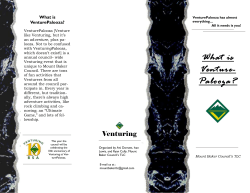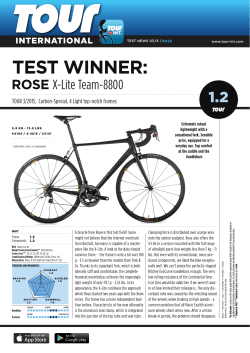
One hundred years ago, thousands of ragged kids
FICTION RICALred by true ISTO H inspi ast a story s from the p event One hundred years ago, thousands of ragged kids had to work selling newspapers on the harsh streets of New York City. THE Newsi 14 Scholastic Scope • MARCH 2015 Drama CHARACTERS Circle the character you Manager will play. Longshoreman: *Indicates a major role worker who loads cargo *Narrators 1, 2, 3 on and off ships (N1, N2, N3) New Yorkers 1 & 2 Crowd: the whole class Factory worker Boots, Rose, Stockbroker Racetrack, Chubbs, WILLIAM Randolph Sully: newsies—kids Hearst: owner of the who sell newspapers New York Journal *Ani: a 12-year-old Assistant immigrant girl Lady: a rich New Yorker AS YOU READ, THINK ABOUT: What challenges did the newsies face? Note: The newsies had their own dialect, or way of speaking. You will encounter this dialect in the play. Scene One The Brooklyn Bridge, August 1899 N1: Some 1,000 children crowd onto the Brooklyn Bridge, bringing traffic to a standstill. Crowd: Newsboys on strike! ies Boots: We demand a fair deal! Rose: Don’t buy the Journal or World newspapers! Newsies in New York City, 1910 Hearst and Pulitzer—when t’ you and me it’s the difference ’tweens eatin’ and goin’ hungry?! Crowd: (whistles, hoots, and cheers) Racetrack: We’s united in our cause! (pointing) Here comes them papes now! Granger, NYC/The Granger Collection By Mack Lewis Racetrack: What’s a dime a day to millionaires like “Papes” was slang for newspapers. N2: A wagon carrying a supply of the New York Journal is trying to get through the crowd. N3: Newsies swarm the wagon like ants on a frankfurter. Boots: Tear ’em up! Throw them papes over the side! N1: The wagon is overturned, and the protesters hurl papers into the East River. The drivers take off running. Racetrack: You tell Mr. Hearst that we ain’t givin’ up! scope.scholastic.com • MARCH 2015 15 Scene Two Manhattan, April 1898 N2: In 1898, newspapers were the only way to know what was going on in the world. N3: The World, owned by Joseph Pulitzer, and the Journal, owned by William Randolph Hearst, were the two biggest. N1: Newspapers were sold by kids called “newsies.” They were poor and often homeless. They used the money they made to feed themselves and their families. N2: Ani approaches the line at the New York Journal’s circulation office. Ani: Is this where you sign up? N3: A few newsies look her over. SO MANY PEOPLE Ö Rose: Wouldn’t you be better off at school? Ani: I wish I could go to school, but I have Cities were growing fast as Americans left their farms and immigrants streamed in from Europe. By the 1890s, New York was a bustling metropolis. Packed trolleys clattered around the city. The smells of cooking, horse manure, and factory smoke hung in the air. The streets were crowded and often filthy. to help my family survive. Rose: All right. We’ll teach ya all the tricks. Rose: It is good news for us. Boring news don’t sell papes. Chubbs: We buy newspapers two for a penny, but we Chubbs: Get yer papers here! War with Spain! sell ’em for a penny apiece. LongshoremaN: War? Are you exaggerating again, kid? Rose: If you sell ’em all, you double your money. Chubbs: No, sir. It’s right here in the headlines. Racetrack (walking up): Who’s this? N2: The man hands Chubbs a penny. Ani: I’m Ani. New Yorker 1: I’ll buy a newspaper. Racetrack: Hiya, Ani. My friends call me Racetrack. New Yorker 2: I’ll take two! N1: Racetrack pushes his way to the circulation window. N3: In just a few minutes, Chubbs sells a dozen papers. Manager: How many ya want? Rose: Now you try, Ani. Racetrack: I’ll take 100. Ani: Read all about it! War with Spain! N2: He plunks down 50 cents. Factory worker: I’ll take one. Change for a nickel? Manager: Sorry, kid. Price has gone up to 60 cents. But Ani (handing him coins): Here you go. you won’t have trouble selling the whole lot of ’em N1: The worker dashes off. when people hear this headline: America Declares War! Chubbs: Next time, give him just three cents. Most fellas Racetrack: In that case, gimme 200! won’t even notice. N3: Ani, Rose, and Chubbs wait their turns. Ani: That isn’t honest. N1: They pool their money and buy 100 papers. Rose: Maybe not, but that’s the dodge. C’mon, we’ll Scene Three Later that day, the Bowery show ya some others. Chubbs: Look forlorn whenever ya can. Ani: Forlorn? Chubbs: These will be easy to sell. ChubbS: Crutch Morris, he always limps like he’s Ani: How do you know? crippled. Kid Blink, he wears an eye patch. If the Rose: Cuz the news is good. customer thinks you’re down and out, they take pity on Chubbs (shouting): Hot off the press! America at war! ya and buy a pape. Sometimes they’ll buy two. Ani: War? How is that good news? N2: Ani frowns. 16 Scholastic Scope • MARCH 2015 Granger, NYC/The Granger Collection (New York crowd); The New York Historical Society/Getty Images (Skyline) Chubbs: Don’t we all. N1: And with no war news to report, the newsies struggle to sell papers. Chubbs: I’m callin’ it quits. Rose: Me too. Ani: I still have 40 papers left. If I go home now, I’ll have lost money! Rose: Sorry, Ani. N2: Ani stands alone in the cold. The bundle feels heavy under her arm. Ani: Get your Journal here! N3: No one buys. N1: A trolley clangs by. Ani slogs to the nearest stop. Ani: Extra! Extra! Could America return to war? N2: A face peers out from the streetcar. Stockbroker: I’ll take one. Change for a dime? Ani: Sure, Mister. N3: She digs in her pocket. The trolley bell clangs. Stockbroker: Hurry up! Ani: I’m trying. Chubbs: There’s lots of dodges. Sell to folks gettin’ on N1: The trolley begins moving. Ani runs alongside. the trolley. Let the car pull away before you come up N2: She reaches for the man’s outstretched hand— with their change. N3: —then watches as the car rumbles away with the Ani: I may be desperate, but I won’t cheat people. stockbroker glaring at her. Chubbs: Just you wait till it’s pourin’ rain and the only N1: She looks at the dime and hangs her head. thing in the news is a cat up a tree. N2: A moment later, she sees the customer from the Scene Four Canal Street, July 1899 N3: Months have passed. The war with Spain has ended. trolley. He’d gotten off at the next stop. Stockbroker: You! Girl! You owe me some change! Ani: I’m sorry. I didn’t mean it. Stockbroker: Sure you didn’t. I know your tricks! N3: He grabs her by the ear. Stockbroker: Now fork over that dime. Courtesy of the Library of Congress (Working Kids) Scene Five Irving Hall, the next morning N1: Rose, Boots, and Chubbs enter a room packed with newsies. Jack “Sully” Sullivan addresses the crowd. WORK, WORK, WORK Ö Millions of kids had to support themselves or their families. Some worked hawking newspapers, flowers, or candy. Others got jobs in factories and mines, where they were surrounded by dangerous machinery and toxic substances. Many never went to school or even learned to read. Sully: Mr. Hearst and Mr. Pulitzer promised to drop the price once the war was over. Did they keep their promise? Crowd: No! Sully: They’re squeezing us dry! The time has come when we must make a stand. I say we strike! scope.scholastic.com • MARCH 2015 17 Crowd: Strike! Strike! Strike! penny ain’t too many! Two fer a penny ain’t too many! Sully: Spread the word that nobody—NOBODY—sells Hearst: Now boys, I’m just trying to run my business. papes. If you sees anyone sellin’ da World or Journal, ya The war increased my costs. swat ’em good. Racetrack: The war increased your profits! Boots: You mean swipe da papes? Hearst (shouting): I’ll give two dollars a day to anyone Sully: Yeah! Tear ’em up! who crosses the picket line! N2: Racetrack shows his fist to the crowd. Scene Six Racetrack: Do it and you won’t make it a block! Sully: How is it you can pay scabs two dollars but you N2: After the meeting, Chubbs looks for Ani. can’t pay us 10 cents? N3: He finds her curled up in an alley. Boots: Yer tryin’ to break us. Chubbs: Where ya been? Racetrack: But we’re stickin’ together like glue! Ani: I was out all night trying to sell my papers. N3: Hearst retreats into the building. N1: She begins to cry. Newsies: Two fer a penny ain’t too many! Ani: I still have 32 left. I couldn’t go home and face my Scene Eight family. Especially after trying that stupid trolley dodge! Central Park, the next day Chubbs: I’m sorry, Ani. But there’s good news. We’re goin’ on strike. We’re gonna force Hearst and Pulitzer to N1: Ani, Chubbs, and Rose pass out leaflets. lower the price back to 50 cents. Chubbs: Is that yer stomach growlin’? When was the Ani: Strike? Now I won’t make anything! last time you ate? Chubbs: Don’t worry. Sometimes ya have to sacrifice a N2: Ani shrugs. Chubbs hands out another leaflet. little up front to get what’s best down the road. Lady (reading): “Please don’t buy the World or Journal newspapers.” What’s this? Scene Seven Rose: It’s cuz we’re on strike. Hearst’s car, the next day N3: The woman crumples it up. Assistant: The newsies’ strike is hitting us hard. Ani (crestfallen): This is not going to work. Hearst: What are the numbers? Chubbs: I hear circulation of the Journal is in the pits. Assistant: Sales have dropped by 60 percent. Rose: Yesterday I saw a guy tryin’ to sell papes. Some Hearst: This must be hurting Pulitzer too. newsies tore up every pape he had. Assistant: They say his N1: A factory worker financial losses are approaches them. colossal. But he’ll only compromise if you do. Hearst: I’ve worked too NOWHERE TO GO Ø Many orphaned kids slept on the streets, in condemned buildings, or in stables. Factory worker: You kids stay strong. N2: He gives them each hard to have this paper a penny. ruined by a bunch of brats. Factory worker: Those N2: Hearst sighs heavily. newspaper men should N3: They arrive at Hearst’s not be cheatin’ children offices. The driver gets out to make their fortunes. and opens the door. Ani: Thank you, sir. N1: A crowd of newsies has N3: Boots runs up, gathered outside. excited. Boots: It’s Mr. Hearst! Ani: What happened, Newsies (all): Two fer a Boots? 18 Scholastic Scope • MARCH 2015 The New York Historical Society/Getty Images (Skyline); Jacob A. Riis/Hulton Archive/Getty Images (Orphans) Broome Street, a few hours later A CHANGING WORLD Ö The labor movement began in the 19th century as workers banded together to demand better treatment from their employers. Their efforts led to new laws that protected the rights of workers. Boots: The protest has spread to the Bronx and Long Boots: Yeah! Island. We’s got Yonkers and Brooklyn locked up too. SULLY: We’ll take it! Hearst ’n Pulitzer will give in soon, you wait ’n see. Crowd: Wooooo! Yeah! Yeah! Wooo! Scene Nine Bettmann/CORBIS (Child Labor Strike) The Brooklyn Bridge, August 1899 Epilogue Ani: Being able to sell papers saved my family from N1: Newsies clog the bridge. homelessness. But I never did get to go to school. Racetrack: You tell Mr. Hearst we ain’t givin’ up! Rose: I got to go to school! N2: The last papers go flying over the side of the bridge. Boots: You’re lucky. I went to work at the docks. Crowd: Wooo! Woooo! Yeah! Chubbs: That was the reality for most of us newsies. N3: A hush falls over them. Hearst’s car pulls up. Ani: But our strike showed us that we had power. Hearst: Listen up! I’m offering a compromise. I won’t Rose: It showed us that we had rights— reduce the price to 50 cents, but if you go back to work, Boots: —even though we was just kids. I will buy back all the papers you don’t sell each day. Ani: It would be nearly 40 years before laws were Mr. Pulitzer is offering the same deal. passed protecting kids from unsafe working N1: A murmur floats through the group. conditions. Ani: Is that a good deal? Rose: Today, it’s illegal for kids in America to work Chubbs: Sure it is. On those bad news days when you more than 18 hours on a school week. And all children can’t sell yer papes, you’ll get yer money back. have the right to an education. N2: Ani calls out. Boots: Most of us never saw those laws pass in our Ani: I like it! lifetimes. Chubbs: Me too! Ani: But our bravery helped pave the way. • writing contest Civil rights leader Roger Baldwin once said, “Silence never won rights. They are not handed down from above; they are forced by pressures from below.” Explain what this quote means and how it applies to the play. Use text evidence. Send your response to NEWSIES CONTEST. Five winners will each receive Brooklyn Bridge by Karen Hesse. Get this activity Online scope.scholastic.com • MARCH 2015 19
© Copyright 2025









